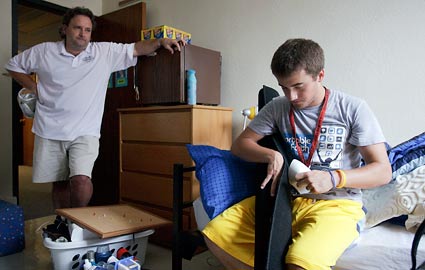UNITED STATES—Statistically, half of all married couples fall out of love and eventually divorce. Many try to stay together ‘for the sake of the children’, hoping to spare them the pain of a broken family. When these emerging adults move out of the family home to go to college, the ability for the unhappy couple to stay together becomes more difficult, even intolerable. As the children were the glue that held the fragile marriage together, the marriage often falls apart.
When children leave the family home, parents typically find themselves assuming a lower level of importance in their children’s lives. Because of this, couples sometimes believe that successfully launched children won’t be impacted by parental divorce. After years of marital discord, unhappy parents assume it is finally the right time to divorce.
Your adult children may act like they don’t need or care about you, but they really do. At 18-21 years old they are still vacillating between desires to be independent and a yearning to feel taken care of. With that in mind, explain to your child what will take place during and following the divorce process, and what they can expect the impact will be on them. They will have questions such as where will their parents be living? Is the family home to be sold? Where will holidays and summer vacations be spent? Will the tuition continue to be paid?
Students have a lot of responsibilities and choices in the first years out of the family home; being responsible for waking up on time in the morning, learning to get along with roommates, building new friendships, making decisions about involvement with sex, drugs and alcohol, and dealing with a competitive academic schedule. Your divorce announcement may burst their protective bubble from childhood, leaving them feeling vulnerable. This vulnerability comes at the exact point in which they are starting to develop long lasting relationships. Their confidence in being successful at developing a long and lasting romantic relationship may be shattered. To compensate, and to feel more in control, they may respond by blaming one of the parents, or shutting down emotionally.
They may not want to share feelings and concerns. Talk to them anyway, even if they do not open up with you. Reassure them that you are always available to answer any questions. Assure them that there is nothing to be ashamed of, and encourage them to talk to their friends, roommate, dorm resident assistant, other family members, counselor, or clergy.
By the time your children have left the family home, they have been exposed, through friends, television and movies, to the potential take-no-prisoners battlefield of divorce. Prepare your children for what the legal process entails, but assure them that you and your spouse will be civil to each other. Assure your children that they do not need to make choices between parents. Do not discuss the negative issues involving your ex-spouse. Remember; your child is 50% the other spouse. If you trash your ex-spouse, you are also trashing your child.
During a divorce, parents are distracted and grieving. Children can misconstrue this to mean that they are no longer important to their parents. Make it clear that the parents are divorcing each other, not the kids. Also let your children know that they are not responsible for your happiness. It was not their job to keep the marriage together, and it is not acceptable for them to volunteer for that role. I have worked with college students who have put themselves at risk of flunking out of college, or have engaged in at-risk behaviors such as drugs and alcohol, to get expelled from school and have to come home and care for a parent.
Remind your children that their job is to have success and fun at college. If you are positive in how you speak about your future, it will give them hope. Encouraging your college students to play a role in decorating the room in your new home will make them feel a greater sense of belonging. Develop new traditions for the holidays, teaching your children that the future can be hopeful despite the loss of many familiar and predicable aspects of their family life. These behaviors communicate to your children that you have hope. Hope is contagious. Hope will help the entire family move through the parental divorce in a healthy and positive manner.
Eileen Lenson, MSW, ACSW, Board Certified Coach, is a life and business coach in private practice. She gives community presentations on preparing for the empty nest and parenting a child in college. She has been a guest on KABC radio Ledger On The Law show, and written articles for various publications around the country. Prior to becoming a life coach, Eileen was a licensed clinical social worker for 20 years and author of Succeeding In Private Practice: A Business Guide For Psychotherapists. For further information, write to her at Eileen@LensonLifeCoaching.com,call her at 949-244-5100 or visit her website at www.LensonLifeCoaching.com.






